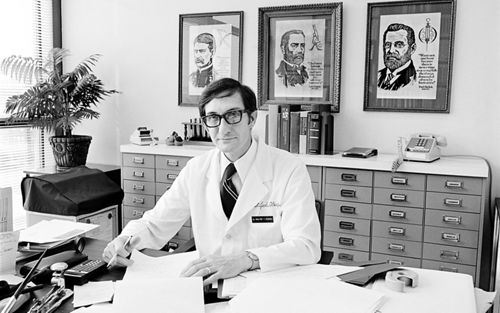St. Jude Family of Websites
Explore our cutting edge research, world-class patient care, career opportunities and more.
St. Jude Children's Research Hospital Home

- Fundraising
St. Jude Family of Websites
Explore our cutting edge research, world-class patient care, career opportunities and more.
St. Jude Children's Research Hospital Home

- Fundraising
St. Jude mourns the death of infectious diseases pioneer Walter Hughes, MD

Walter Hughes, MD, helped establish the St. Jude Department of Infectious Diseases and served as the department’s chair from 1969–77 and again from 1981–95.
As a pioneer in his field, Walter Hughes, MD, helped position St. Jude Children’s Research Hospital as a world leader in pediatric infectious diseases during a remarkable career that deeply influenced countless lives in Memphis and beyond.
Hughes, an emeritus faculty member in Infectious Diseases, died August 8, 2021, at the age of 91.
He joined St. Jude in 1969 and was one of the first physicians to specialize in pediatric infectious diseases. Hughes helped establish the hospital’s Department of Infectious Diseases and served as the department’s chair from 1969–77 and again from 1981–95.
Hughes initiated pediatric AIDS research at St. Jude and held the Arthur Ashe Chair in Pediatric AIDS Research from 1993–98. He became an emeritus faculty member in 1998. In addition, Hughes was the co-founder and first elected president of the Pediatric Infectious Diseases Society of America.
“The life of Dr. Hughes offers an example to emulate. His tenacity in the face of challenge and his belief that all children deserve hope for the future pushed the bounds of discovery and saved untold lives,” said St. Jude President and CEO James R. Downing, MD. “We honor his legacy by upholding the St. Jude mission for children today and generations to come.”
Hughes played a pivotal role in cancer treatment early into his career with St. Jude. As the Total Therapy studies in the early 1970s increased survival rates for children with acute lymphoblastic leukemia, preventing and treating infection became the next obstacle to tackle. After the intense cancer therapy, more patients with weakened immune system began to die of infection rather than cancer. In 1973, Hughes led work that identified Pneumocystis pneumonia (PCP) as a life-threatening infection in pediatric cancer patients. He and his colleagues found that 20% of pediatric cancer patients contracted the fungus.
“Almost single-handedly, Walter used an animal model to develop a therapy that was then applied in St. Jude patients in a classic clinical trial published in the New England Journal of Medicine. Within a short time, the incidence of PCP in St. Jude patients dropped to zero, allowing a significant improvement in cure rate for pediatric ALL,” said Charles Sherr, MD, PhD, Tumor Cell Biology chair.
The research showed that the drug combination trimethoprim and sulfamethoxazole (TMP-SMX) was highly effective for PCP prevention and treatment. In 1981, PCP was the first opportunistic infection identified in patients with HIV/AIDS. The drug combination remains the most commonly used drug to prevent or treat PCP in patients with AIDS.
“Dr. Hughes was a gracious and brilliant clinician whose compassion for children with HIV/AIDS led to the enormously impactful discovery of TMP-SMX as a simple and 98% effective antibiotic treatment for deadly PCP pneumonia that affects all immunocompromised patients,” said Elaine Tuomanen, MD, Infectious Diseases chair. “I was awed by his scope of knowledge and the drive to impart it to young trainees. He remained a part of Infectious Diseases clinical rounds well after stepping down from chair, and I will always remember that each clinical question spawned a story that made his vast clinical knowledge stick with us. His legacy will shape the entire Pediatric Infectious Diseases Society for many decades to come.”
Hughes authored more than 500 articles in peer-reviewed journals and medical textbooks. He also published seven books, including On Hallowed Ground: St. Jude Children’s Research Hospital, in which he discussed the hospital’s origins and growth. Hughes frequently shared his musing via Facebook, most recently posting a series called “Poor Walter’s Almanac and Diary,” in which he offered 76 columns, featuring humorous and insightful takes on current events, history, science, medicine and life around him.
“In addition to being brilliant, Walter was kind and generous to all. He was an outstanding mentor for me during my training and as a young faculty member. I am extremely grateful for the opportunity,” said Pat Flynn, MD, deputy clinical director, senior vice president and medical director of Quality and Patient Care.
St. Jude Oncology Chair Ching-Hon Pui, MD, praised Hughes’ commitment to medicine, helping to improve the lives of future generations of children and adults with cancer or immunodeficiencies.
“Walter’s seminal research was creative and meticulous,” Pui said. “His dedication to patient care, teaching and mentoring was unsurpassed and provided a model for many at St. Jude and around the world. He was kind, humble and unassuming, a great leader with profound intellect and integrity. He will be dearly missed.”
Born in Cleveland, Tennessee, Hughes served in the U.S. Army Medical Corps and held positions at University of Louisville School of Medicine, Louisville General Hospital, Louisville Children’s Hospital, University of Tennessee College of Medicine, and the Johns Hopkins Hospital and University School of Medicine.






